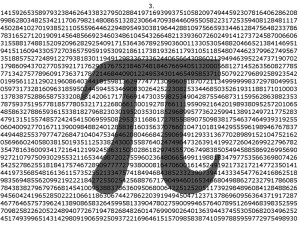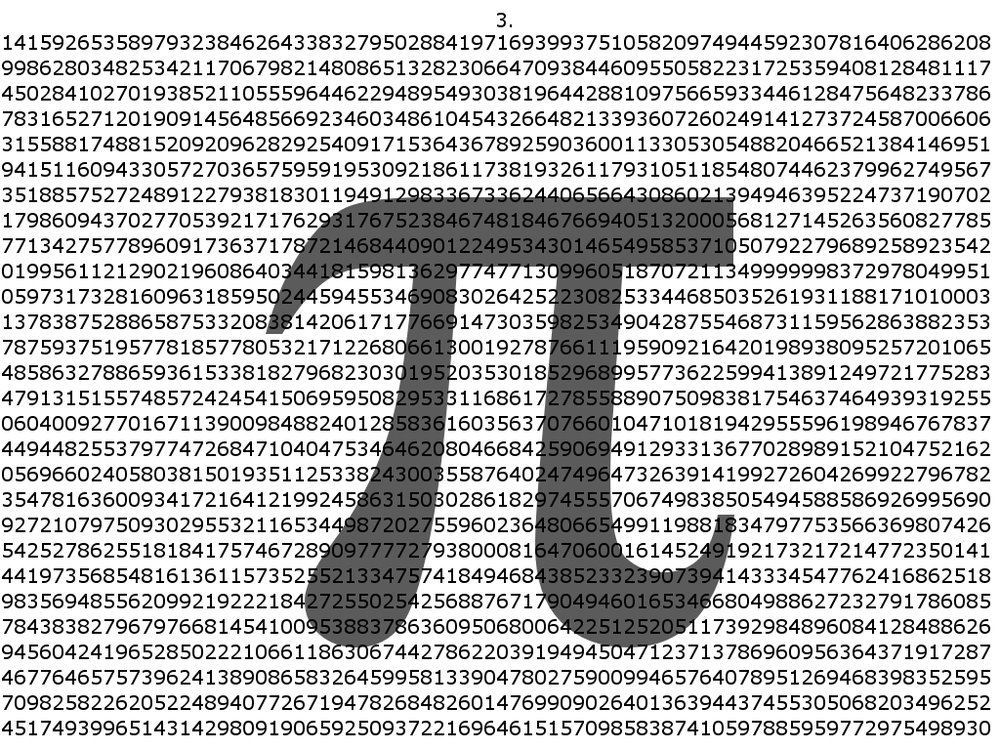by Jeremy Lane (Math & Stats editor) and Mykola Matvichuk

Pi wallpaper (by Train-Heartnet, CC BY-NC-ND 3.0)
1. Using approximations by polygons in 250BC, Archimedes was the first person to compute an approximate value of pi.
True or False?
Answer: False. A collection of Sanskrit texts called the Sulbasutra dating back to 600BC (and arguably based on knowledge that had existed for hundreds of years prior) contains many detailed geometric constructions used to build ceremonial altars, including a proof of the Pythagorean theorem. Although far less accurate than Archimedes’ bounds (3.1408 < Ï€ < 3.1429), the text contains the approximate value of 3.088 for pi. Approximate values have also been found in much older Babylonian texts, but without the surrounding mathematical work found in the Sulbasutra.
2. In 1998, Alabama State Senator L.L. Lawson, citing the Bible as evidence, introduced and narrowly passed a bill declaring the value of pi to be 3.
True or False?
Answer: False. This was an elaborate April Fool’s joke that originated in a newsgroup in 1998. Something similar actually happened in Indiana in 1897, but the bill did not pass.
3. Every possible finite sequence of the numbers 0-9 appears in the decimal expansion of pi.
True or False?
Answer: Unknown! A number is called “normal to base 10” if every sequence of digits in its decimal expansion occur with the same probability. For example, for a normal number the probability of picking a random string of three consecutive digits and getting the number 141 is 1/1000. Although it’s known that many normal numbers exist, mathematicians are still determining whether common numbers like pi, sqrt(2) or e are normal.
4. Think memorizing times tables was hard? Try memorizing 30 million digits of pi like Ukrainian mnemonist Andriy Slyusarchuk, also known as “Doctor Pi”.
True or False?
Answer: False. Andriy Slyusarchuk was a Ukrainian scam artist, who claimed to be a mnemonist, psychic and neurosurgeon. He got the nickname “Doctor Pi” for performing shows where he would recite from memory digits of the decimal expansion of pi. On one of his shows, he claimed to have memorized one million digits of pi. Then, when asked to recite random parts of the expansion, he would do it without a mistake. This was recorded to the Book of Records of Ukraine, and then-President of Ukraine Viktor Yushchenko congratulated him with this achievement. Subsequently, Slyusarchuk improved his results by memorizing 30 millions of digits of pi.
The fraudulence of these activities was revealed later, when “Doctor Pi” was arrested for illegally performing brain surgery and having a forged doctor’s certificate. He was sentenced to eight years in prison for “killing by negligence”.
According to the Guinness Book of World Records, the most digits of pi ever recited is 67,890 by Chao Lu.
5. And finally, for the real math geeks among you
True or False?
Answer: True! Working essentially alone — before moving to England and collaborating with G.H. Hardy — Indian mathematician Srinivasa Ramanujan discovered this and 16 other surprising formulas for 1/pi by studying elliptic integrals. The advantage of these formulas is their fast convergence, which has been used in many record-breaking computations of the digits of pi.
Happy Pi Day!
For more on these and other Pi Day facts, see these resources:
- Henderson and Tainmina, Experiencing Geometry, 2005.
- Seidenberg, The Ritual Origin of Geometry, 1961.
- Jörg and Christoph, Pi Unleashed, 2006.
- http://en.wikipedia.org/wiki/Normal_number
- http://mathworld.wolfram.com/NormalNumber.html
- http://www.math.uiuc.edu/~berndt/articles/monthly567-587.pdf
- http://math.stackexchange.com/questions/14115/motivation-for-ramanujans-mysterious-pi-formula
- https://sites.google.com/site/tpiezas/0013





